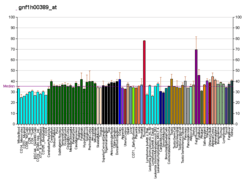Fibroblast growth factor receptor-like 1
Fibroblast growth factor receptor-like 1 is a protein that in humans is encoded by the FGFRL1 gene.[3]
The protein encoded by this gene is a member of the fibroblast growth factor receptor (FGFR) family, where amino acid sequence is highly conserved between members and throughout evolution. FGFR family members differ from one another in their ligand affinities and tissue distribution. A full-length representative protein would consist of an extracellular region, composed of three immunoglobulin-like domains, a single hydrophobic membrane-spanning segment and a cytoplasmic tyrosine kinase domain. The extracellular portion of the protein interacts with fibroblast growth factors, setting in motion a cascade of downstream signals, ultimately influencing mitogenesis and differentiation. A marked difference between this gene product and the other family members is its lack of a cytoplasmic tyrosine kinase domain. The result is a transmembrane receptor that could interact with other family members and potentially inhibit signaling. Multiple alternatively spliced transcript variants encoding the same isoform have been found for this gene.[3]
References
Further reading
- Maruyama K, Sugano S (1994). "Oligo-capping: a simple method to replace the cap structure of eukaryotic mRNAs with oligoribonucleotides". Gene. 138 (1–2): 171–174. PMID 8125298. doi:10.1016/0378-1119(94)90802-8.
- Suzuki Y, Yoshitomo-Nakagawa K, Maruyama K, et al. (1997). "Construction and characterization of a full length-enriched and a 5'-end-enriched cDNA library". Gene. 200 (1–2): 149–156. PMID 9373149. doi:10.1016/S0378-1119(97)00411-3.
- Wiedemann M, Trueb B (2001). "Characterization of a novel protein (FGFRL1) from human cartilage related to FGF receptors". Genomics. 69 (2): 275–279. PMID 11031111. doi:10.1006/geno.2000.6332.
- Kim I, Moon S, Yu K, et al. (2001). "A novel fibroblast growth factor receptor-5 preferentially expressed in the pancreas(1)". Biochim. Biophys. Acta. 1518 (1–2): 152–6. PMID 11267671. doi:10.1016/s0167-4781(00)00282-7.
- Sleeman M, Fraser J, McDonald M, et al. (2001). "Identification of a new fibroblast growth factor receptor, FGFR5". Gene. 271 (2): 171–182. PMID 11418238. doi:10.1016/S0378-1119(01)00518-2.
- Strausberg RL, Feingold EA, Grouse LH, et al. (2003). "Generation and initial analysis of more than 15,000 full-length human and mouse cDNA sequences". Proc. Natl. Acad. Sci. U.S.A. 99 (26): 16899–16903. PMC 139241
 . PMID 12477932. doi:10.1073/pnas.242603899.
. PMID 12477932. doi:10.1073/pnas.242603899. - Trueb B, Zhuang L, Taeschler S, Wiedemann M (2003). "Characterization of FGFRL1, a novel fibroblast growth factor (FGF) receptor preferentially expressed in skeletal tissues". J. Biol. Chem. 278 (36): 33857–33865. PMID 12813049. doi:10.1074/jbc.M300281200.
- Clark HF, Gurney AL, Abaya E, et al. (2003). "The secreted protein discovery initiative (SPDI), a large-scale effort to identify novel human secreted and transmembrane proteins: a bioinformatics assessment". Genome Res. 13 (10): 2265–2270. PMC 403697
 . PMID 12975309. doi:10.1101/gr.1293003.
. PMID 12975309. doi:10.1101/gr.1293003. - Ota T, Suzuki Y, Nishikawa T, et al. (2004). "Complete sequencing and characterization of 21,243 full-length human cDNAs". Nat. Genet. 36 (1): 40–45. PMID 14702039. doi:10.1038/ng1285.
- Zhang Z, Henzel WJ (2005). "Signal peptide prediction based on analysis of experimentally verified cleavage sites". Protein Sci. 13 (10): 2819–2824. PMC 2286551
 . PMID 15340161. doi:10.1110/ps.04682504.
. PMID 15340161. doi:10.1110/ps.04682504. - Gerhard DS, Wagner L, Feingold EA, et al. (2004). "The status, quality, and expansion of the NIH full-length cDNA project: the Mammalian Gene Collection (MGC)". Genome Res. 14 (10B): 2121–2127. PMC 528928
 . PMID 15489334. doi:10.1101/gr.2596504.
. PMID 15489334. doi:10.1101/gr.2596504. - Antoine M, Wirz W, Tag CG, et al. (2005). "Expression pattern of fibroblast growth factors (FGFs), their receptors and antagonists in primary endothelial cells and vascular smooth muscle cells". Growth Factors. 23 (2): 87–95. PMID 16019430. doi:10.1080/08977190500096004.
- Schild C, Trueb B (2006). "Aberrant expression of FGFRL1, a novel FGF receptor, in ovarian tumors". Int. J. Mol. Med. 16 (6): 1169–73. PMID 16273302. doi:10.3892/ijmm.16.6.1169.
